News Round-Up: EU Dumps Privacy for AI, UN Cyber Pact Fuels Spying and France's Freedoms Gutted Post-Paris Attacks
Every week, the editorial team of Freedom Research compiles a round-up of news that caught our eye, or what felt like under-reported aspects of news deserving more attention.
Over the past week, the following topics attracted our attention:
EU Officials Agree to Sacrifice Europeans’ Privacy for the Sake of Artificial Intelligence
US Secretary of Energy on the UN Climate Change Conference: “They Have Lost Their Minds”
UN Agreement on Cybercrime Boosts State Surveillance
The 2015 Paris Attacks Expanded Police Powers and Eroded Civil Liberties
Hessian Authorities Randomly Label Citizens as Right-Wing Extremists
EU Officials Agree to Sacrifice Europeans’ Privacy for the Sake of Artificial Intelligence
The European Commission has quietly and carefully planned a major change to digital rules in digital omnibus, including the General Data Protection Regulation (GDPR). According to internal documents leaked to the public, the plan is to allow large technology companies such as Google and Meta to use Europeans’ personal data to train artificial intelligence models, writes The Brussels Times. The aim is reportedly to reduce bureaucracy and strengthen the competitiveness of European companies, especially in the field of artificial intelligence, where Europe lags behind the United States and China the most.
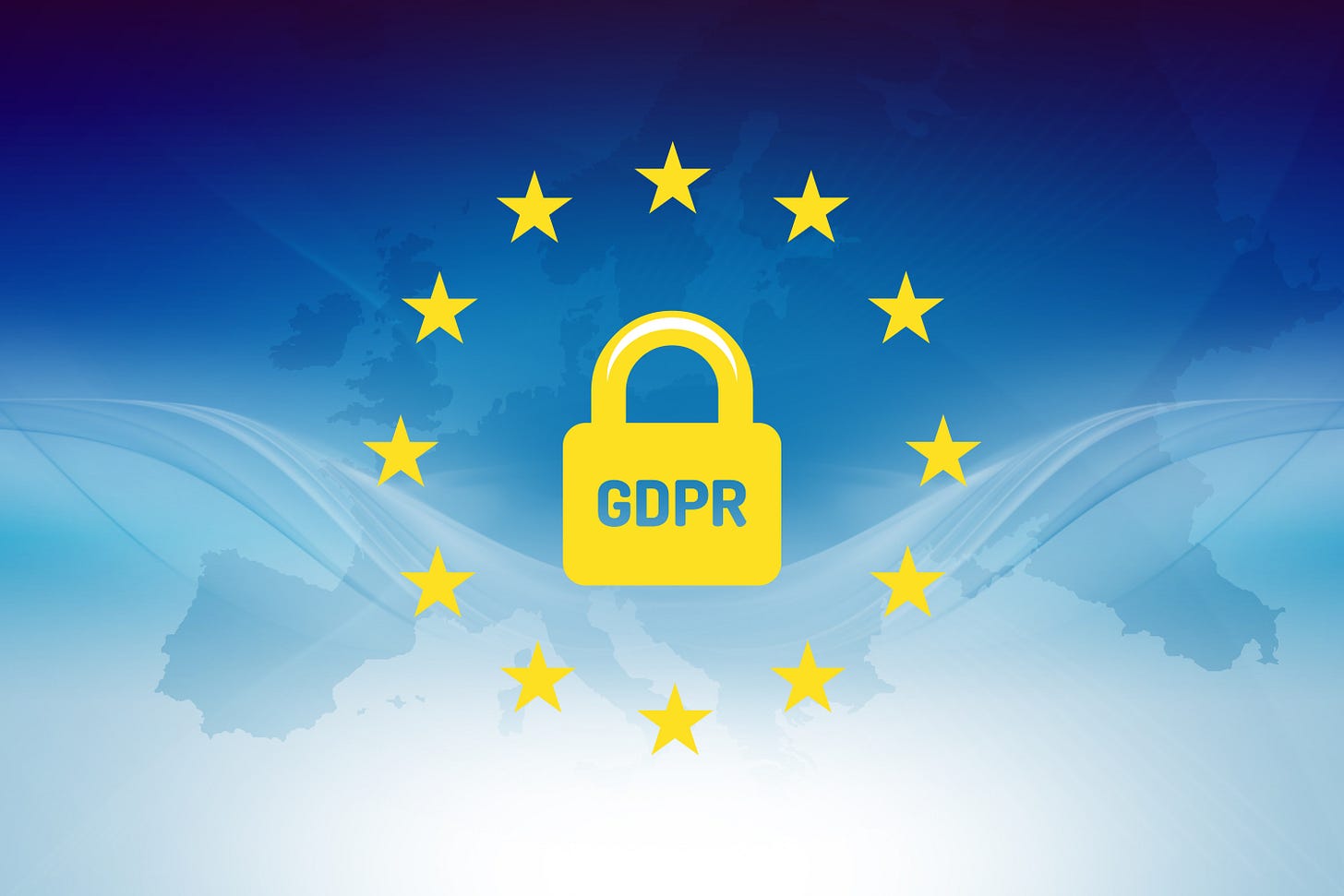
According to NOYB, an Austrian privacy group, the EU is creating broad exceptions under the pretext of competitiveness for businesses to train artificial intelligence. Technology companies would be allowed to process large amounts of personal data – such as browsing history, social media communications, and location data – without the user’s explicit consent. One of the changes is a narrowing of the definition of “personal data”, meaning that fewer types of data would be considered personal in the future. This means that the most strictly protected personal data, such as health information, political/religious views, or sexual orientation, would only be protected if it is “directly revealed”, rather than inferred from other data, and under the new rules, artificial intelligence companies would be allowed to process this data for AI training with minimal safeguards. It is worth noting that, according to a recent ruling by the EU’s highest court, pseudonymized personal data may not be covered by the GDPR for certain recipients who lack reasonable means to re-identify individuals.
The provision referred to as the “artificial intelligence exception” would apply in cases of non-targeted use, where the data helps to improve the model in general, rather than to create personalized advertising. The Commission considers the change to be important from an innovation perspective, pointing out that strict rules hinder the development of artificial intelligence. At the same time, Commission officials argue that the proposals to simplify the GDPR do not affect the fundamental principles of the regulation. However, leaked internal documents acknowledge potential risks, such as data breaches and biased algorithms. This clearly suggests the Commission is prioritizing economic benefits over other interests.
Privacy advocates and civil society groups have been quick to condemn the initiative. Max Schrems, founder of NOYB, described the update as a gift to large technology companies, mainly American companies that develop artificial intelligence and are valued at trillions (e.g., OpenAI, Google, Meta, Amazon, Microsoft). Schrems said: “The draft is not just extreme, but also very poorly drafted. It is not helping ‘small business’, as promised, but again mainly benefiting ‘big tech’.” All at the expense of citizens, of course, said Schrems, warning that the change could legalize mass surveillance.
In addition, there are plans to allow remote access to a person’s computer or smartphone without the user’s permission and under the guise of legitimate interest. The Commission plans to create up to 10 legal grounds for accessing personal data in a person’s device – or placing surveillance technology on the device. In any case, according to NOYB’s legal analysis, the wording is “extremely permissive” and would also allow for extensive searches of the user’s device.
The European Commission has promised to publish the package on November 19, 2025. Member states will then have to approve the package, but according to Politico, many countries already disagree with the changes to the GDPR, including France, Austria, Estonia and Slovenia. Germany, historically considered one of the most privacy-conscious countries, is instead pushing for major changes to help advance the development of artificial intelligence.
US Secretary of Energy on the UN Climate Change Conference: “They Have Lost Their Minds”
U.S. President Donald Trump has decided not to attend the international climate conference COP30, which is being held in Brazil from November 10 to 21, preceded by the summit of heads of state. His Secretary of Energy, Chris Wright, called the conference harmful and misguided and believes that world leaders should shift their focus from climate to people. However, the leaders participating in the summit remain convinced of the extreme necessity of addressing climate change and the tragedy of climate change.
Wright has criticized the climate movement since taking office and now talked critically also of the COP conference. “It’s basically a fraud. It’s not an honest organization that wants to improve people’s lives,” AP News reports his comment. Wright added that he may attend next year’s COP summit, but only to try to bring some common sense to the table.
At the UN General Assembly in September, US President Donald Trump called climate change “the greatest hoax ever perpetrated on the world.” Regarding this year’s COP30, Trump announced that no senior US officials would be attending. “President Trump will not jeopardize our country’s economic and national security to achieve vague climate goals that destroy other countries,” explained White House press secretary Taylor Rogers.
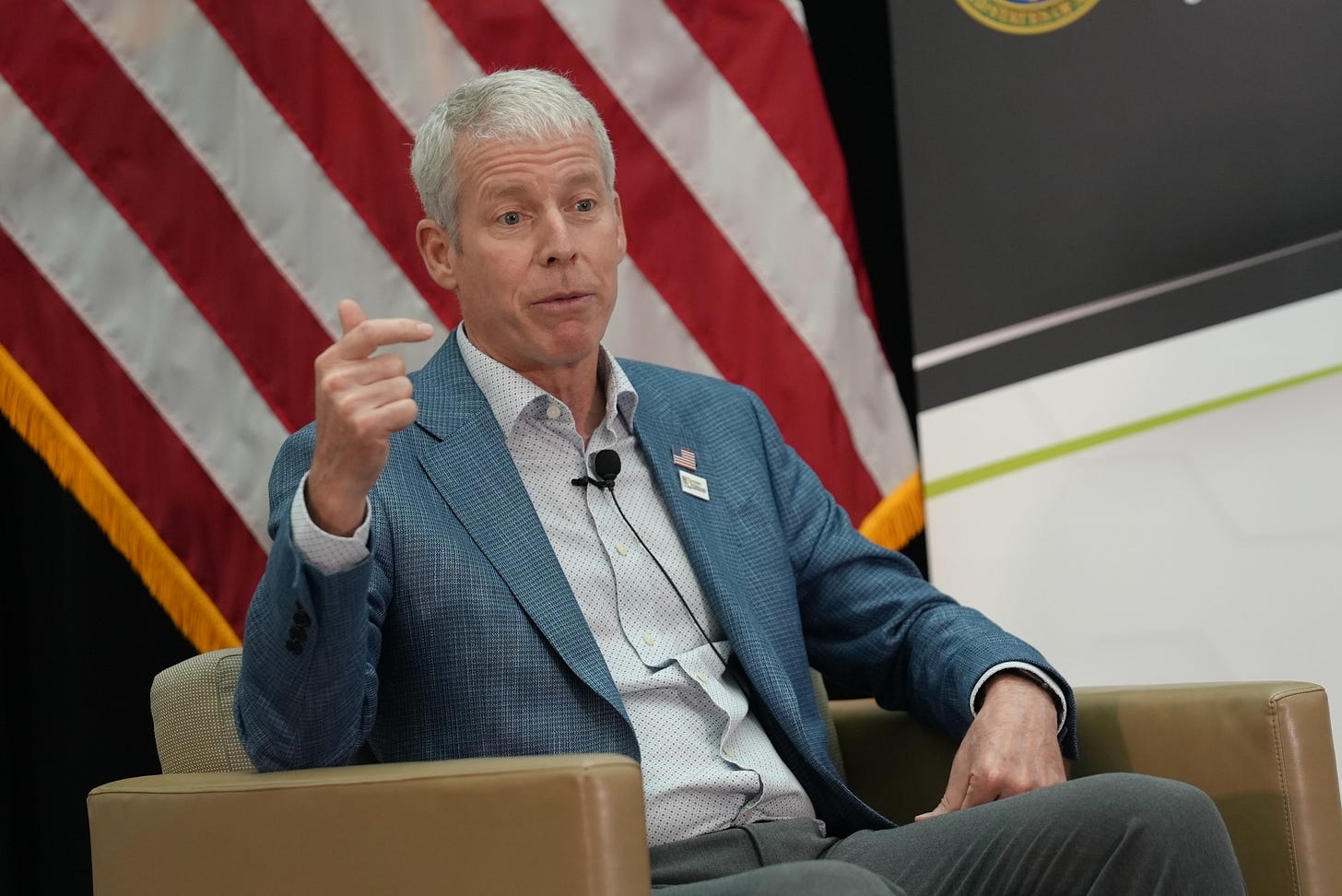
Wright believes that meetings between world leaders should focus on energy availability, economic growth, and technological development, rather than fear-driven environmental protection. According to the Secretary of Energy, the focus should be on people, not on scaring them (see also, for example, here) and increasing the power of governments. “They have lost their minds,” Wright said. It is interesting to note that Bill Gates, who had previously predicted a climate catastrophe, has also recently retracted his position, saying that climate change will not destroy humanity and that it is more important to look at how people are coping.
Energy Secretary Wright’s comments are in line with those of President Trump, including his decisions to withdraw from global climate agreements and prioritize fossil fuels again. Top US officials have also generally been critical of the European Union’s carbon dioxide emission reduction policy. In their view, the EU’s climate transition is damaging economic growth, democratic alliances, and global leadership in artificial intelligence and energy innovation.
The UN Climate Change Conference COP30 would usually set the global agenda in the field. However, the US position is in sharp contrast to that of the leaders participating in the COP30 summit. In their opening statements, key officials repeated warnings that global warming is accelerating, mainly due to emissions from the burning of fossil fuels such as oil, gas and coal. UN Secretary-General António Guterres said that inaction is a moral failure that will cause hunger, displacement, and increasing environmental damage. Once again, the Secretary-General failed to take into account numerous scientists who, in their research, have found the UN and other climate models overestimate global warming and have claimed that human impact is much smaller than thought (see also here, here, here, here, etc.).

The UN has confirmed that climate change has already begun and that urgent action is needed to avoid irreversible damage. Shortly before the Belém meeting, the UN weather service announced that 2025 is likely to be the second or third warmest year in recorded history. At the same time, there is evidence that heat records are based on flawed data, and weather stations consistently record short-term abnormal temperature increases, with urbanization having a significant impact on temperature data. On Thursday, the World Meteorological Organization also announced that the concentration of greenhouse gases in the atmosphere, which rose to record levels last year, continued to rise in 2025 and that the ocean has warmed. At the same time, the fact that has been overlooked is that higher CO2 levels benefit the environment in other ways, i.e. by allowing forests and plants to flourish, as proven by scientists in the case of the Amazonian rainforest, as well as by the authors of the US climate report. The continued warming of the ocean has been found questionable as well.
Colombian President Gustavo Petro said in a speech on Thursday: “Right now, Mr. Trump is against humanity. His absence is proof of that. So what should we do? Leave him alone. Oblivion is the greatest punishment.” Brazilian President Luiz Inácio Lula da Silva took a more moderate tone regarding Trump’s absence, expressing hope that his US counterpart would eventually change his mind. “Perhaps never before have Washington leaders been so determined to bring the United States back into the fight against the climate crisis,” said Manish Bapna, president of the Natural Resources Defense Council, on Friday.
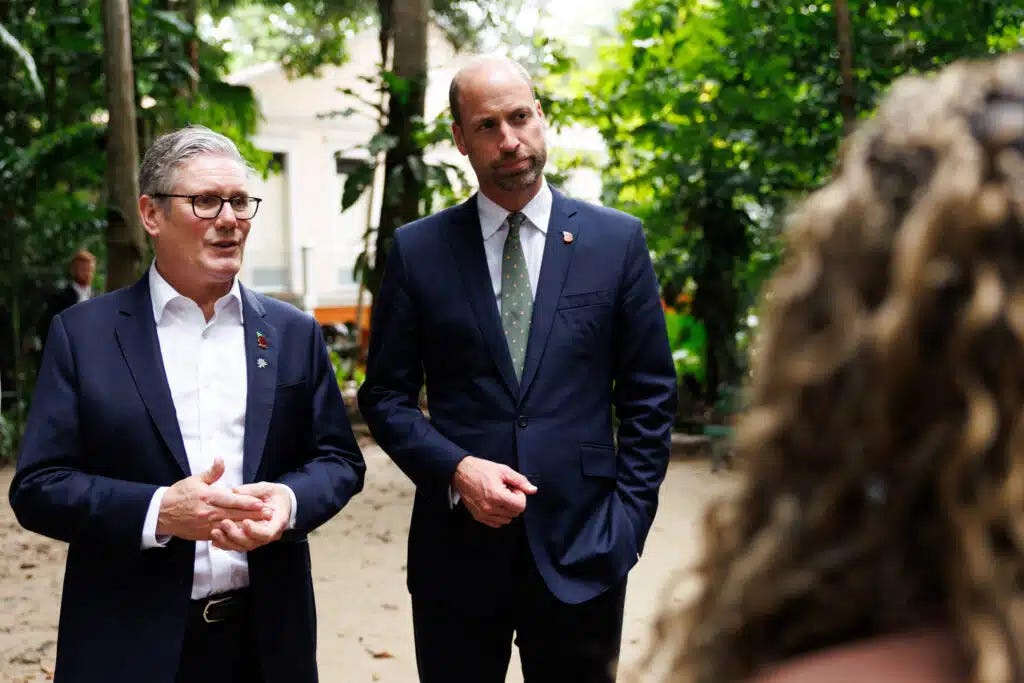
Prince William of Wales urged world leaders to be bold in tackling climate change and highlighted the potential of a clean economy, new technologies, and a secure, affordable energy system to improve livelihoods and protect future generations. British Prime Minister Keir Starmer naturally supported Prince William’s message and confirmed that the United Kingdom would continue on its chosen path of addressing climate change. In fact, there are plans to double the efforts to combat climate change. The Prime Minister described how inaction would only raise energy prices and leave communities more vulnerable to instability. “Flooding (see here – ed.) ... rising food prices ... increased migration ... and growing security threats” are not just problems that need to be solved, according to Starmer, but also a huge opportunity that must be seized. Climate measures are expected to create thousands of new jobs and reduce household costs, even though the UK is suffering from job losses due to climate policies and ever-increasing energy prices (see also here and here), and the prioritization of solar parks has jeopardized the country’s food security.
UN Agreement on Cybercrime Boosts State Surveillance
In October, the UN announced that dozens of member states (72 countries), inc the European Union, had signed the UN Convention on Cybercrime in Hanoi, with 40 member states having already ratified it. The countries that have joined the convention commit to fighting cybercrime, sharing collected data with other countries, and prosecuting fraud. Critics say the convention threatens privacy and freedom of speech and obliges countries to engage in electronic surveillance. The document has even been called a surveillance agreement, writes Reclaim The Net.
The UN General Assembly adopted the document in December 2024 after five years of negotiations. The agreement, or Convention against Cybercrime, establishes a universal set of rules for investigating crimes committed online, gathering evidence, and prosecuting crimes in court, including freezing, seizing, or confiscating the proceeds of such crimes. According to the UN, the new agreement criminalizes a number of crimes that depend on cyberspace and are committed using cyberspace, facilitates the cross-border sharing of electronic evidence, and creates a network for cooperation between countries. Cybercrimes can include ransomware and financial fraud, but the convention also treats the distribution of intimate images without consent as a completely new criminal offense in the global context. According to the UN, the new convention should change the way countries fight cybercrime at a time when digital threats are on the rise. It is estimated that the cost of global cybercrime will reach $10.5 trillion (€9.14 trillion) per year this year.
At the signing ceremony, Guterres said: “The UN Cybercrime Convention is a powerful, legally binding instrument to strengthen our collective defences against cybercrime.” Guterres added: “Every day, sophisticated scams defraud families, steal livelihoods and drain billions of dollars from our economies.” Now, however, he claimed, no country, regardless of its level of development, should remain unprotected against cybercrime. Guterres noted that the convention must not be used in any form for surveillance or anything else that could be related to human rights violations, adding in conclusion: “Let us build a cyberspace that respects everyone’s dignity and human rights – and ensure that the digital age delivers peace, security, and prosperity for all.”
The United Nations Office on Drugs and Crime (UNODC), which led the negotiations, has stated that the treaty includes protections for human rights and legitimate research, but organizations such as Human Rights Watch (HRW) and the Electronic Frontier Foundation (EFF) disagree. These groups have advised governments not to ratify the treaty because its vague definitions could allow governments to monitor citizens, prosecute security researchers, and restrict political freedom of expression, and could allow governments to abuse the provisions to target journalists, researchers, and activists. The organizations believe that the convention goes far beyond the malicious treatment of cybercrime, i.e. to computer networks, systems, and data, by obliging countries to establish electronic surveillance. This includes crimes that, in the organizations’ assessment, are not related to information and communication systems.
In addition, according to the convention, electronic evidence must be shared with the authorities of other countries in the case of any “serious crime,” which shall mean “constituting an offense punishable by a maximum deprivation of liberty for at least four years, or a more serious penalty.” It should be noted, however, that there are currently quite a few countries in the world that criminalize activities protected by international human rights law and impose penalties for them, such as criticizing the government, peaceful protest, same-sex relationships, investigative journalism, and disclosure of information (see also here, here, here). Among the countries that have signed the new convention, these would bee China, Russia, Belarus, Vietnam, et al. This raises the question of whether the laws that stifle civil rights in these countries could also be transferred to European countries by signing the convention.
According to Human Rights Watch, the convention gives extensive rights to monitor, store and share information between countries in a way that undermines trust in secure communications and violates human rights. It allows for the excessive sharing of personal data because “law enforcement agencies must cooperate,” thereby exceeding the limits of a specific criminal investigation. Finally, HRW writes that the convention even puts the very people at risk that it purports to protect.
Technology companies have also expressed concern. The Cybersecurity Tech Accord, whose members include Meta and Microsoft, has called the agreement a “surveillance agreement.” The association believes that the convention paves the way for data to flow out of the country and allows for real-time surveillance, secretly and without safeguards. The association also points out that since the provisions defining cybercrime have been removed from the convention, this means that all the rights set out in the convention can be used in any activity involving the use of digital technology, including legal online activities, so-called ethical hacking, and so on.
It is also noteworthy that the signing ceremony was organized by Vietnam, which can in no way be considered a model example of protecting civil rights and public safety. On the contrary, the country is very eager to imprison citizens for years for “violating the interests of the state” and to punish these people in any way possible. In addition, just recently, millions of bank accounts that were not biometrically verified, were closed by the state.
But the UN, which is supposed to stand for peace, security, and human rights, has its Secretary-General Guterres believe that Vietnam has an important role to play in the global digital supply chain. “It is fitting that [the signing ceremony] takes place here – in a nation that has embraced technology, powered innovation and become an essential part of the world’s digital supply chains,” Guterres rejoiced, urging countries to quickly ratify and implement the agreement. Vietnamese President Luong Cuong welcomed the agreement, saying that it both marks the birth of a global legal instrument and confirms the enduring vitality of multilateralism, where countries transcend differences and are prepared to jointly take responsibility for the common interests of peace, security, stability, and development.
The 2015 Paris Attacks Expanded Police Powers and Eroded Civil Liberties
On November 13, 2015, coordinated ISIS-claimed attacks struck Paris cafés, the Bataclan theater, and the surroundings of Stade de France, killing 130 and injuring hundreds. The French government immediately declared a state of emergency, granting police broad anti-terrorism powers – at the cost of certain civil liberties, of course. A decade later, many emergency powers granted have become permanent norms, with even stricter surveillance has been introduced in the meantime, according to France24.
France had rarely used states of emergency before 2015 (apart from Algeria in the conflict of 1950s–60s, and New Caledonia in the 1984, 2005 riots). However, the scale of the 2015 attacks forced then-President François Hollande to declare one and enact laws expanding authority. Authorities gained rights to house-arrest suspects without trial on suspicion of threat; seize legally acquired weapons and ammunition; block websites they believed were promoting or inciting terrorism and disband charity organizations the government believed were disrupting public order.
These new powers enabled quick arrests post-attack, but were soon misused for unrelated probes, said Nathalie Tehio of the Human Rights League (la Ligue des droits de l’Homme), who described how police conducted an enormous number of searches unrelated to terrorism. The state of emergency also empowered the French government to ban demonstrations and prevent other forms of activism. For example, during the COP21 climate conference in December 2015, dozens of climate activists were placed under house arrest for its duration.
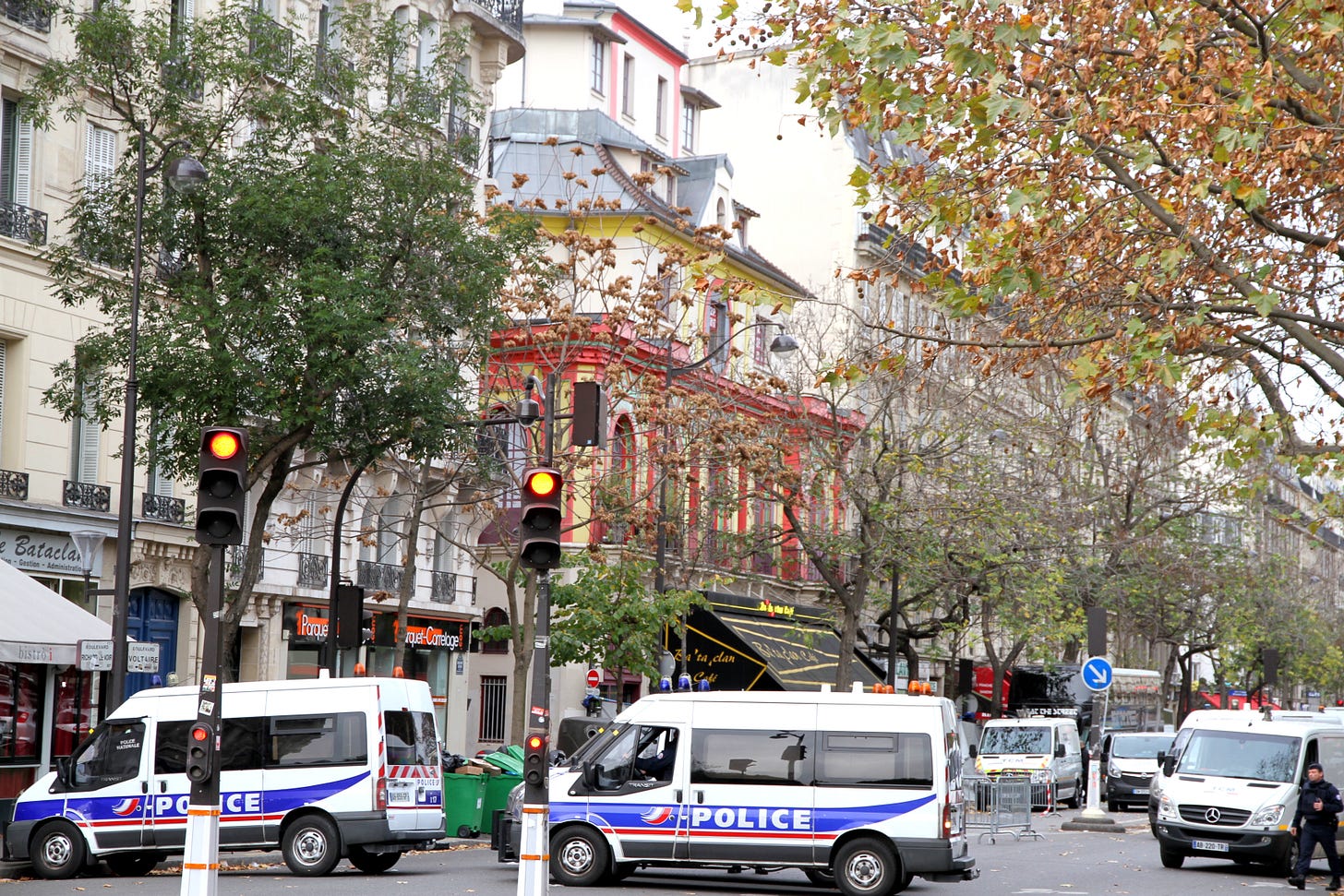
Initially, the new powers granted with the state of emergency were set for three months, but were extended till May 2016, and then three more times after the Nice attack (July 14, 2016). They ended November 1, 2017 – nearly two years later. According to Nathalie Tehio, however, people became so accustomed to the idea that emergency measures were possible over such a long period that “they went from something that should be exceptional to something that is used to manage the public.”
Just before the state of emergency was lifted, the government decided to retain some powers and, in October 2017, passed the Anti-Terrorism Act (la loi Sécurité intérieure et Lutte contre le terrorisme - Silt), which brought emergency measures into everyday law. House arrest was renamed individual administrative control and surveillance measures (mesures individuelles de contrôle administratif et de surveillance – Micas), and administrative searches were renamed home visits (visites domiciliaires). Local authorities gained additional powers to control access to areas they designated as prime terrorist targets.
According to Nicolas Klausser, a specialist at the Centre for Sociological Research on Law and Penal Institutions (Cesdip), Micas particularly shows how much the law has undermined people’s rights in France. However, on paper, protective measures are very relative in real life. Administrative judges approve 90% of Micas cases and never question the intelligence reports sent to them by the Ministry of the Interior. Before 2015, the Ministry of the Interior could only freeze assets or impose travel bans on French citizens, but now the scope is much wider. Any connection with a terrorism convict may trigger a Micas or home visit. For example, based on security data for the 2024 Paris Olympics, 848 home visits were made and 547 Micases were implemented – about four to five times the annual average since 2017 – demonstrating extensive police intervention and targeting.
In 2021, a law was introduced requiring public sector-supported charities to sign a “commitment agreement”, forcing compliance with authority-set principles. The 2022 law allows the use of surveillance drones for domestic security. The law enacted for the 2023 Olympic Games allowed testing of algorithmic video surveillance until March 2025. Tehio explained: “First they say it’s experimental, then it becomes normal. … First there are drones, then artificial intelligence, then facial recognition. For a long time, we pointed the finger at China and said it was a dictatorship [because of its use of such surveillance methods], but now France is doing the same thing,” Tehio added.
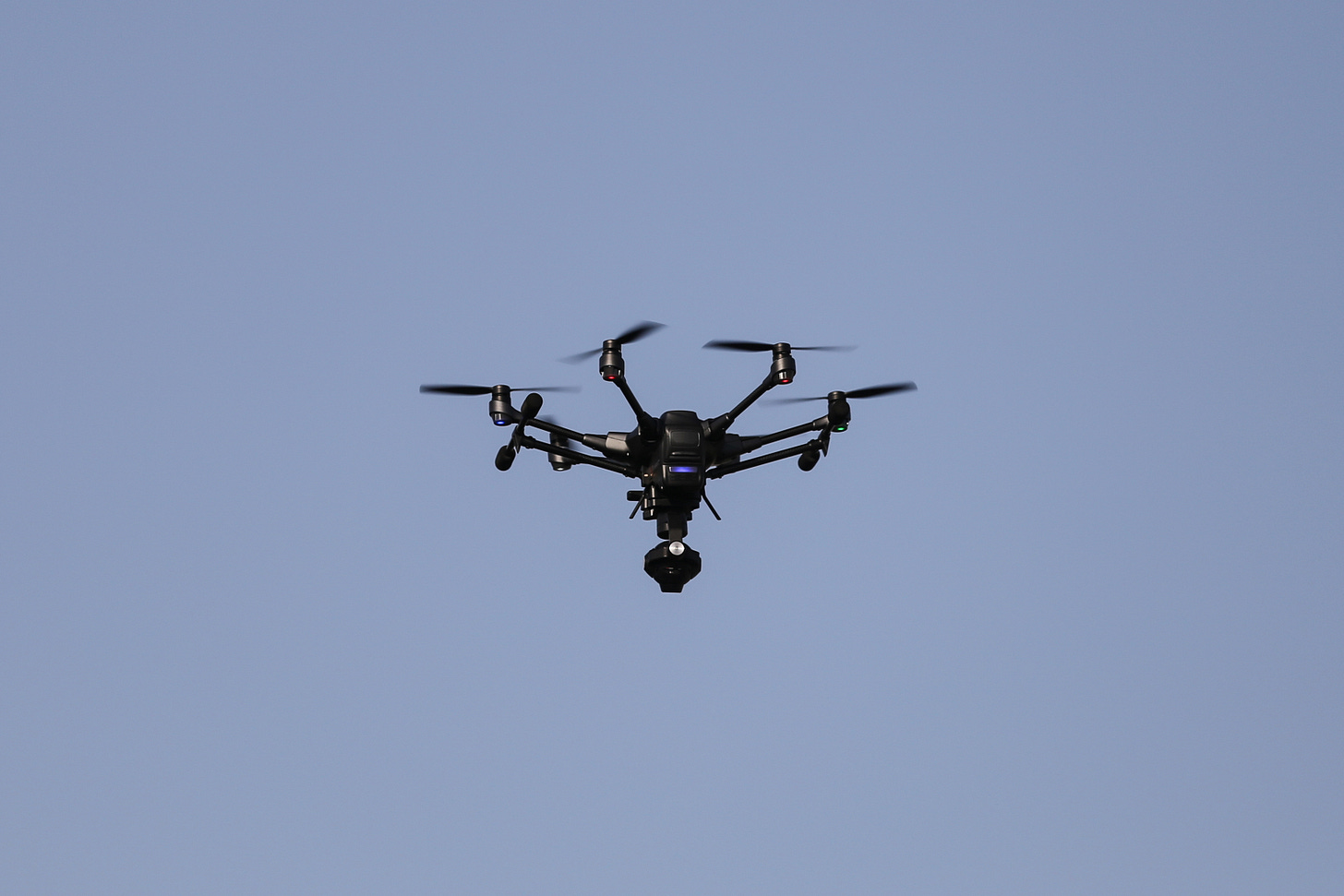
However, the government insists these measures are necessary to combat terrorism, with intelligence services assessing the risk as very high. The director of France’s anti-terrorism unit, la Direction générale de la sécurité intérieure, stated that as of February 2025, 79 planned attacks had been prevented since 2015. Critics, on the other hand, say this is just rhetoric. While strict measures were initially introduced to eliminate doubts, in everyday life they are often not linked to any direct threat. On the contrary, the state blurs the line between administrative and criminal law and any authority can try add desired groups to the list. Now, the broad powers of the authorities are increasingly woven into French society, including the lives of law-abiding citizens. According to an Amnesty International report, around 11,000 people were arrested during the Yellow Vest protests in France in 2018–2019, but only about 3,000 were convicted. In 2023, during pension reform protests, authorities banned demonstrators from areas near President Emmanuel Macron’s visits.
According to Nathalie Tehio, the greatest danger lies in people becoming accustomed to the loss of freedom, surveillance, and an increasingly authoritarian state. “It’s a dangerous trend that is currently underway, leading towards the dismantling of all dissent. Many people are now giving up on protesting, including advocacy organizations. We are in the process of diminishing our democracy.”
Hessian Authorities Randomly Label Citizens as Right-Wing Extremists
The Hessian Office for the Protection of the Constitution (Verfassungsschutz) classified an anonymous economics professor in Hesse and former AfD (Alternative für Deutschland) city council member as a potential right-wing extremist. The key trigger was that in September 2023, the man had spent the night at the home of Jürgen Elsässer, editor of the so-called right-wing extremist magazine Compact, after failing to find a hotel room during a Berlin trip. The agency deemed this incidental contact sufficient grounds for suspicion, despite the professor having left politics and the AfD years earlier, writes Eugyppius.
It must be noted that for the Hessian Office for the Protection of the Constitution to make such a decision, it must be assumed that the agency was already monitoring the Elsässer home. Having observed the professor arrive and depart, the agency deemed this incidental contact sufficient grounds to classify him as a potential right-wing extremist. And although there were already more than 52,000 “right-wing extremists” on the Office for the Protection of the Constitution’s list by early 2024, most of them are unaware that they have been placed on the list. In the professor’s case, however, his employer – the university – took matters into its own hands and suspended him on January 15, 2024, citing a report from the Hessian Office for the Protection of the Constitution that assigned him to the “right-wing extremist scene.” He was issued an immediate “ban on performing his duties,” prohibited from entering university premises or contacting students, and his work laptop was confiscated the next day.
This measure lasted 16 months until it was ruled unlawful by the Hessian Administrative Court of Appeal in spring 2025, leading to his reinstatement. The court ruled in his favor, criticizing the university for basing its decision solely on the report without conducting a more thorough investigation itself. The court noted that mere contacts do not prove unconstitutional activity.
But the investigation had lasted nearly two years and included restrictions placed on his bank account and him and his wife being interrogated. According to the professor, his contact with the Elsässer family was incidental, based on a prior neighborly acquaintance with Stephanie Elsässer, and there were no political ties between them. However, this was to no avail, as according to the professor, both his employer and the Hessian Office for the Protection of the Constitution seemed to doubt the truth of his statements and treated him as a serious criminal.
Ultimately, no evidence of extremist activity was found. The entire case was therefore based solely on a connection with another person, or, as in the former Federal Republic of Germany, communication with a politically suspicious person is a sure way to become politically suspicious yourself.
After incurring approximately €50,000 in legal fees, the professor was finally able to return to his position, but he demanded that the Hessian Office for the Protection of the Constitution hand over the file it had compiled on him, which was more than 2,000 pages long. The file revealed that the man had been under surveillance long before 2023, apparently because of his AfD background. His phone calls and e-mails had been monitored, and attempts had been made to photograph him at events he had never attended.
The German domestic intelligence system consists of 16 state offices for the protection of the constitution (Landesämter für Verfassungsschutz), coordinated by the federal Bundesamt für Verfassungsschutz (BfV). While the BfV and other federal agencies like the BND and BKA focus significantly on terrorism and counterintelligence, the state offices – including the Hessian LfV – primarily monitor domestic political extremism among ordinary citizens, looking for signs of threats to the democratic order.



The UN Cybercrime Convention is particularly troublin when you consider that countries like China and Russia are signatories. These regimes already criminalize dissent and journalism, and now they have a formal mechanism to request data from other nations on their critics abroad. The vague definition of serious crime coupled with mandatory cooperation basicaly turns this into a backdoor extradition treaty without proper safeguards. Its alarming how quickly these powers expand once legitimized, similar to what happened in France after th Paris attacks.
Thank you for the information.